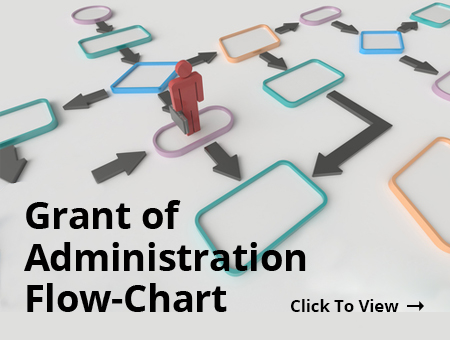ESTATE LAWYER SINGAPORE
We understand that it is never easy losing a loved one, and that many complex, and often difficult emotional issues need to be dealt with. Our team of empathetic estate lawyers and legal administrators are here to help you.
At Gloria James-Civetta & Co, we make the process of distributing your loved one’s estate as simple and hassle-free as possible. We offer Fixed-Fee Grant of Representation services for straightforward cases, to help you obtain the Grant of Probate & Letters of Administration in an expedited and cost-effective manner.
Our Affordable Fixed-Fee Probate & Letter of Administration packages start from $1200 plus GST.
Contact us today to find out how we can assist you.
If the person left a Will
The estate should be distributed in accordance with their wishes. The person or persons responsible for doing this, known as the executor (or executors), are usually named in the Will.
In order to carry out this task, the executors will need to tender certain documents to the Court in order to apply for a Grant of Probate.
Applying for a Grant of Probate
A Grant of Probate gives the executors authorization to administer the estate of the deceased, in accordance with their Will. Before completing an application for Grant of Probate, you must ensure that the Will either implies or expressly states who the executors are to be. The formal requirements for the validity of a Will must also be satisfied.
You should apply for a Grant of Probate within six months from the date of death of your loved one. Our estate lawyers and administrators can assist you by filing an originating summons alongside the relevant documents required for making the application.
If the person did not leave a Will
Where there is no Will, or the Will of the deceased is incomplete or found to be invalid, a spouse or other next of kin of the deceased must apply to the Court to be appointed the deceased’s personal representative and administrator of the estate. The process for appointing an administrator or administrators is known as Grant of Letters of Administration.
Applying for Letters of Administration
Letters of Administration authorise an appropriate person to be appointed as an administrator and to distribute the estate of the deceased in line with the law of Singapore.
The law sets out seven classes of persons who are entitled. In order of priority, these are:
- the spouse;
- the children of the deceased;
- the parents;
- brothers and sisters;
- nephews and nieces;
- grandparents; and,
- uncles and aunts.
Where any of the beneficiaries of the estate is aged under 21 years of age, two or more administrators must be appointed.
Our experienced estate lawyers and administrators can explain your responsibilities and obtain formal administration (Probate & Letters of Administration) from the Courts of Singapore to bring in the assets and distribute the estate assets to the beneficiaries.
A will provides for the administration and distribution of your estate upon death.
Your estate is essentially everything that you own; it includes your properties, investments and possessions. A will ensures that your loved ones would be provided for according to your wishes.
In your will, you may also include how you would like your body to be dealt with upon death (e.g. funeral, burial, cremation or for therapeutic uses).
In Singapore, you can write your own will as long as you are 21 years and above, of sound mind and free from fraud, coercion or undue influence.
In the absence of a will, your estate will be distributed in accordance to Singapore’s Intestate Succession Act.
The priority of distribution is as follows: (1) Spouse, children (2) Parents (3) Siblings (4) Grandparents (5) Aunts and Uncles.
The beneficiary who has a prior right under the Intestate Succession Act will have to apply to court for a Grant of Letters of Administration. This is so that the courts can appoint personal representatives to administer and distribute the deceased’s estate.
- Your estate may not be distributed according to your intentions
- You will not have a choice of the person who would be distributing and administering your estate (i.e. your executor(s)). Instead, the courts would appoint personal representatives.
- You cannot decide who would be your children’s guardian
- If you are in the midst of a divorce where final judgment has not been granted, your surviving spouse may be entitled to a significant portion of your estate.
You may provide for:
1. Specific gifts (specific items and property)
2. Residual gifts (remains of your estate after specific gifts have been distributed and debts paid)
3. Substitutionary gifts (where the original beneficiary cannot receive his or her portion, who the gift may go to)
4. Joint Gifts (gifting of a single asset to two people)
5. Trusts (where your nominated trustees will help to hold on to or use a certain portion of your estate to benefit your particular beneficiary(s) which may include minors or people who lack mental capacity)
It is advisable for you to review your will once every few years to ensure that it really reflects your most current intentions in the administration and distribution of your assets.
You should consider altering your will to reflect new relationships or relationships that you have come to value more with time.
It is important to note that if you get married, any will made prior to your marriage will be automatically invalidated unless you have mentioned in your will of your intention to marry. However, upon a divorce, any will that was made prior to your divorce will remain valid.
With regard to the Singapore’s Inheritance (Family Provision) Act, you can contest a will when you are the deceased’s dependent and the deceased’s will or Intestacy Law does not adequately provide for you. You may contest the will by making an application to the court for a maintenance order to alter the distribution of the deceased’s estate:
1. The Act does not apply to Muslims
2. The Act specifies who qualifies as a dependent
3. The Act specifies that such an application has to be made no longer than 6 months from the time of the execution of the will subjected to the court’s discretion
4. The courts will use their discretion to determine whether a maintenance should be allowed, taking into consideration (a) your past, present or future financial situation (b) your conduct in relation to the deceased (c) whether or not the deceased intentionally refrained from apportioning a part of his estate to you (d) any other relevant matters.
Making of Will
You are strongly advised to engage a lawyer to write your will instead of writing your own. This is because your homemade will may be rendered ineffective due to drafting mistakes or where its validity is contested.
Employing Law Firms as Professional Executors
Where you cannot find someone responsible and whom you trust entirely to administer and distribute your estate, you might want to rely on professional executors such as law firms to be your executors.
Legal Advice
-
- With regard to how the courts would alter the will to pay out maintenance from the deceased’s estate, an estimate of the payment and the methods of payment.
- With regard to the application for Grant of Probate and Grant of Letters of Administration as they involve complex legal procedures and issues.
- With regard to altering your will. Your lawyer would be able to advise you on whether a codicil is sufficient or if you should make a new will. You are advised against altering a will yourself by cancelling certain portions or adding sentences in as if the alterations do not comply with legitimate procedure, it may invalidate the will.
Contact At Gloria James-Civetta & Co, Estate Matters Lawyers, Singapore
Here, at Gloria James-Civetta & Co, our team of Estate Matters lawyers can help you get through this challenging time as efficiently as possible. We understand that estate matters may seem complex, but we work with our clients to explain the process clearly and concisely in language they understand. We can assist you will all kinds of estate matters and also offer a fixed fee Probate service for straightforward cases to help you obtain the Grant of Probate/Grant of Letters of Administration in an expedited and cost-effective manner.

